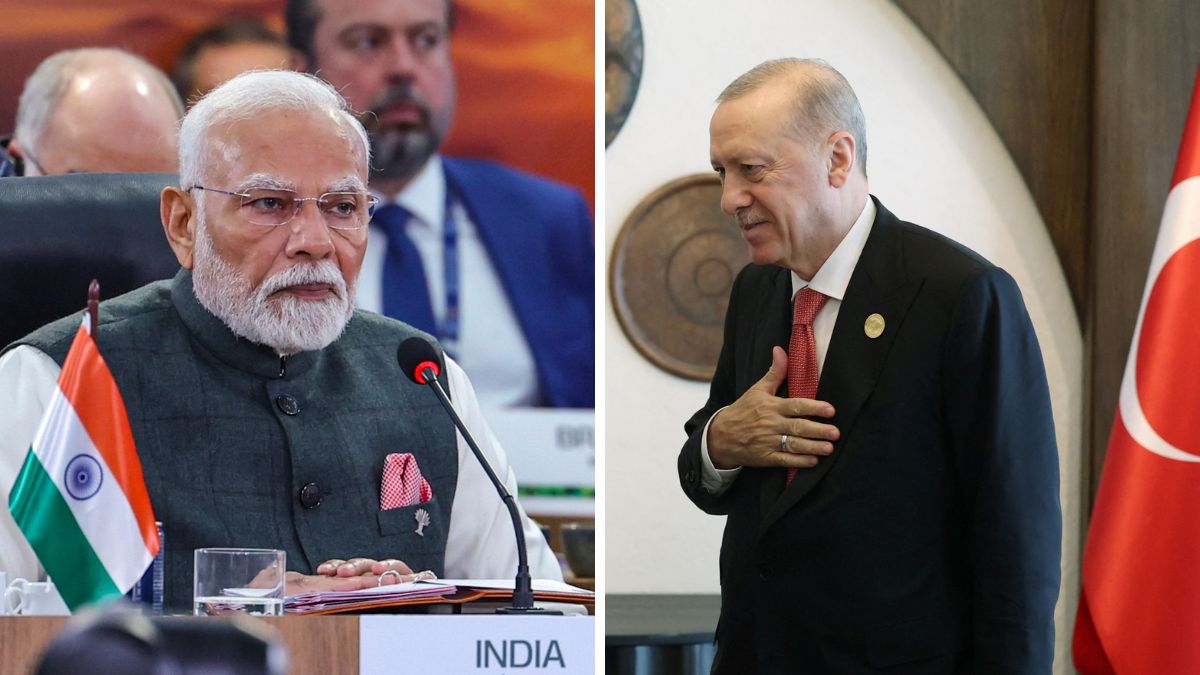Turkish diplomat thinks BRICS snub was India's revenge: 'Pay back for Turkey opposing its NSG entry'
 Prime Minister Narendra Modi at BRICS Summit. (Right) Turkey President Recep Tayyip Erdoğan | Reuters
Prime Minister Narendra Modi at BRICS Summit. (Right) Turkey President Recep Tayyip Erdoğan | Reuters
A Turkish top diplomat has claimed that India's alleged move blocking Ankara's entry into BRICS was a "revenge" against Turkey. However, it has more than just Turkey's close ties with Pakistan.
Former Turkish ambassadors to India and Pakistan Hasan Göğüş said New Delhi's move was a revenge for Turkey opposing India's entry into the Nuclear Supplier Group (NSG). "We also didn't allow India into the Nuclear Suppliers Group for a long time. This situation can be seen as revenge for that and is a consequence of deteriorating relations," Göğüş told the Turkish daily newspaper Cumhuriyet.
India is still not a member of the 48-country Nuclear Supplier Group (NSG), and Turkey was one of the countries that opposed it. The current guidelines of NSG state stipulate that a non-NPT (Nonproliferation Treaty) state cannot become a member of NSG, which keeps India out of the group.
Did Turkey's anti-India policy cost it BRICS membership? Erdogan's hopes dashed for now
His statement comes amid reports that India’s reservation was one of the determining factors in Turkey's BRICS membership process. India was reportedly "the chief opponent" of Turkey's participation due to Turkey's NATO membership and "different approaches to some regional issues."
Göğüş, however, warned the leadership against treating India differently, as it cannot be neglected. "Turkey-India relations have always been overshadowed by Pakistan. We used to maintain good relations with Pakistan without offending India. We used to be careful not to antagonise India, but recently, Turkey-India relations have plummeted. This is a grave situation for Turkey. India has a significant influence in Asia," he added.
Göğüş noted that a perception of a Turkey-Azerbaijan-Pakistan trilateral front, saying, "India filled the void left by Turkey's worsened relations with Greece and Armenia." "The Indian Prime Minister’s visit to Southern Cyprus can also be evaluated in this context. This is not a healthy development," Göğüş said.
He added that the relations have shifted from coldness to hostility in recent years. "For the first time in history, there were negative demonstrations in front of the Turkish embassy. The Turkish image in India was very good. For example, the street in front of the Indian Prime Minister's Residence was named after Kemal Atatürk. Relations must be repaired," he said.
Göğüş also insisted that Turkey return to a softer discourse on the Kashmir issue.
"India's nationalism"
Meanwhile, retired ambassador Halit Bozkurt Aran, who previously served in Islamabad, blamed India for the worsening relations. "Our intense relations with Pakistan do not develop into hostility towards a third country. Mutual accusations between Turkey and India mostly stem from the Indian side. This is due to the growing Indian nationalism within India," he said, adding that Turkey wants to develop relations with "G20 member India."
"The Indian side sees this as competition. I think the reason for this perception is the rapid advancement of Türkiye's defence industry, which is causing unease in India," he alleged.
Middle East